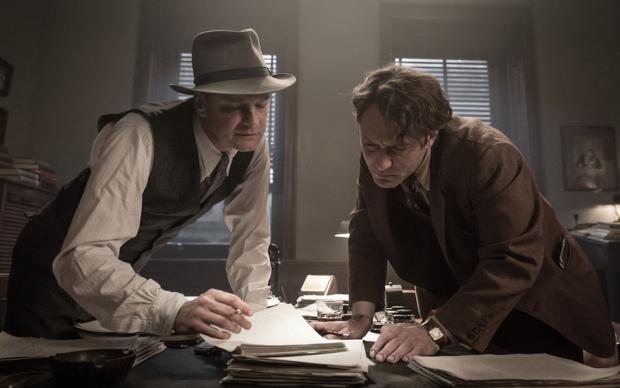The Editing Life: Genius
In Michael Grandage’s Genius, a biopic about 1930s literary sensation Thomas Wolfe and his famous editor, Max Perkins (Colin Firth), Wolfe (Jude Law) is seen furiously scribbling on pages laid on top of his refrigerator. Wolfe actually did this, using his fridge like a pre-Donald Rumsfeld standup desk, although it was probably more natural for Wolfe than it is for the actor, who’s much shorter than the man he’s portraying. Law looks almost nothing like Wolfe, but very few literate people today have any mental image of him, or much interest in his work. About a half-century ago, novelist William Styron asked an undergraduate lit major what he thought of Wolfe and the youngster replied, “You mean the ‘Kandy-Kolored, Tangerine-Flake’ whatchamacallit guy?” (He meant the snarkly hip ironist Tom Wolfe, of course, then enjoying high popularity.)
In the 1930s, Wolfe was a very big deal, indeed, but his name has hardly figured in literary circles for a long time. His sometimes obsessive prolixity, his extended and redundant lyricism, can make for a slog of an experience for today’s readers. Styron referred to Wolfe’s “shambling, celebratory hulk,” and the phrase seems to apply to much of his work, too. And that’s after Perkins devoted unusually considerable trouble and time reducing and shaping Wolfe’s massive manuscripts. At one point in Genius, Wolfe has men haul into Perkins’s office at Scribner several crates of the 5,000-page “final” draft of his second published novel, Time and the River, to Perkins’s dismay. It took them the better part of two years to tame it into publishable condition, according to the movie.
Genius gives us a fair amount of serial clip scenes and brief vignettes of Perkins and Wolfe struggling through their joint editorial labors over Wolfe’s debut novel, Look Homeward Angel, and despite, or even because of, their clashes, bonding personally. In this telling, Perkins is quickly and affectionately amused and sympathetic toward the almost manically ebullient, garrulously self-focused younger man. Soon after Wolfe shows up for the first time at Perkins’s office, the dryly formal editor takes him home for supper, and Wolfe promptly and cluelessly offends Perkins’s aspiring-playwright wife (Laura Linney wasting herself) by disparaging the theatre.
But Wolfe is forgivable, because of his unwieldy, over-impassioned talent, because he makes Scribner many dollars, and because he doesn’t seem quite grown up. The unusual relationship between Perkins and his hard-to-manage writer is, of course, the excuse for the movie, for all the lit talk and art chat. The writing life is really inaccessible to dramatization and cinema. It’s too static and interior.
The developing unexpected rapport and relationship between these two is depicted as part bromance, part Dutch uncle mentorship, even as Wolfe enters his 30s. Calling Law’s Wolfe larger-than-life is something like calling Donald Trump a little incautious in his public statements. The portrayal is too much, and yet, sometimes, it also seems a little mechanically big and gestural. Firth’s Perkins is also too stylized in its way. As he and Grandage render the editor, he’s emotionally suppressed, nearly parodically polite and formal. Throughout Genius, Perkins’s fedora stays on his head: in the office, at mealtime, on a dock in the Florida Keys posing for a photo with Hemingway (Dominic West) and a very large fishing catch. Until, that is, the very last teary scene.
One superficially effective and witty scene epitomizes Firth and Grandage’s approach. Wolfe’s temperamental but abused and abandoned lover (Nicole Kidman faring only a little better than Linney) shows up at Scribner with a pistol to tell Perkins she has to shoot him, Wolfe, or herself, and he, with elegant calm, says by elimination, he’s the logical target.
John Logan’s script is based on A. Scott Berg’s biography of Perkins, and Berg is one of the producers, so presumably a lot of it must be at least semi-factual, but it never seems to much matter. Even in the eventual emotion-charged scenes, it’s a little hard to care. There’s too much artistic assertion and declamation, in the mouths of people who have in reality receded into uninvolving history.
An incidental, probably unintentional product of Genius is to imply the contrast between today’s ginormous multi-platform “media” conglomerates and the more specialized publishing houses of the first half of the last century, where principled, authoritative, even sensitive editorial decisions sometimes won out over vulgar materialistic calculations.

